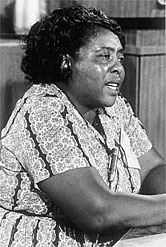
|
|
Performed By
Rhone Fraser
Graduate Assistant, Department of Africana Studies, University of South Florida
Program Overview
"Living Sacrifice: The Life of Fannie Lou Hamer" is a documentary play based on the collected speeches and writings of civil rights activist Fannie Lou Hamer. It is also based on her two biographies, "For Freedom's Sake" by Chana Kai Lee and "This Little Light of Mine" by Kay Mills. This is the powerful story of a woman whose unswerving Christian faith resembles that of Martin Luther King, Jr. while her outspoken demand for social justice matches that of Malcolm X, both of whom she worked with in the civil rights movement. It begins with her duties of chopping cotton as a sharecropper and later details her duties of registering black citizens to vote in the Mississippi Delta of the 1960s. This script is not only informed by Hamer's wisdom and wit, but her strongest tool of nonviolent resistance: the song. From her childhood to deathbed, Fannie Lou Hamer's songs were therapy for herself and her environment. This play is interspersed with three influences that shaped her thinking and life: her childhood (her young self), her mother, and Mary Tucker, who brought her down to Williams Chapel one night in Ruleville, Mississippi, to hear a sermon that forever changed her life. This play is meant to inspire, to inform, and to edify one on how exactly to participate in their own destiny.
This is one woman’s extraordinary struggle of participation in a democracy. Upon deciding to vote, Fannie encounters enormous obstacles: she and her family is kicked off her plantation and is without work. However Fannie perseveres and teaches others to vote. One summer evening in June while returning from a voter citizenship class, Fannie is arrested and beaten brutally in a Winona jail by local white cops who learned of her voter registration activities. Still, Fannie continues to persevere,
registers more voters and runs for state representative in the face of such brazen abuse and intimidation. One day, she leads a group of voters to participate in a Democratic delegation meeting of her state when she found she was locked out of the delegation meeting, figuratively and literally. She with Aaron Henry, Bob Moses, and others founded the Mississippi Freedom Democratic Party (MFDP) in light of the regular Democratic Party’s refusal to recognize black members. Fannie and the MFDP nonetheless attended the 1964 National Democratic Convention and demanded that her delegates, like the regular Democratic party, be seated.
Her nationally televised testimony of her brutal beating at this convention leads to major integration of state delegations and is her defining moment. The Johnson administration and the national Democratic Party are shamed into recognizing the MFDP. Eventually the Johnson
administration then, offered a two seat compromise at the convention which Fannie and the MFDP rejected. Due to voter discrimination in the presidential election that year, Fannie, Annie Devine and Victoria Gray-Adams challenged the official seating of the Mississippi delegates, but lost that challenge. Fannie resolved to involve herself in more local politics and filed several lawsuits against her county, some of which outlawed black voter harassment and improved black schools. She celebrated her thirtieth wedding anniversary at a time when she seriously felt unappreciated. However, she protested up until the year of her death in 1977. Her story is one of perseverance and compassion.
Learn more about Fannie Lou Hammer >
|
|
 |
|
Program Date & Time
10/21/05
7:00 pm
10/22/05
7:00 pm
Admission
Open to the public. Donations greatly appreciated.
|
|